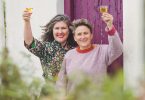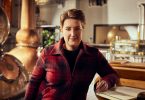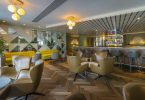Bodytonic’s Trevor O’Shea
We meet first thing in the morning in the very first outlet Bodytonic ever bought, The Bernard Shaw on Richmond Street.
In fact, around about now marks the pub’s 10th Anniversary.
In just a decade Bodytonic has grown from this one Dublin pub to five: The Back Page in Phibsborough, The Square Ball in Hogan Place, The Bernard Shaw on Richmond Street, MVP in Clanbrassil Street and Wigwam on Abbey Street – each with widely differing appeal.
And Trevor’s happy to have no common thread between the bars.
“We don’t think of what we do as running a chain of pubs,” he explains over coffee, “Each has its own unique personality and we try to keep it that way.”
He dismisses four years of Business Studies at DCU. His real learning curve began, he says, when working in The Kitchen nightclub in Temple Bar.
“The irony was that I learned far more from picking up glasses in the nightclub and toilets than I did in four years at DCU. The best education I got was on the floor of The Kitchen.”
Over these past 10 years Bodytonic has experienced different ‘growth spurts’ as Trevor calls them.
“Ten or 12 years ago we were known as music promoters and festival organisers, putting on events and gigs,” he explains, “The fact that the Bernard Shaw was a pub was immaterial to us. It was, to us, more a social space than strictly a pub in the old sense. It merely formed a space in which to put on quirky events.
“That the bar sold alcohol was really just the economic vehicle for putting on music acts.”
The Bernard Shaw thrived and afterwards came the Twisted Pepper on Abbey Street. After that came the collapse in 2008.
Sobering.
“For four or five years we tried to survive, so it taught us how to really run a business. We grew up,” he remembers, “That provided the foundation for the growth spurt that we’ve hit in the last two or three years.”
Brewtonic
Through its Brewtonic arm, Bodytonic also brews a number of its own beers. Indeed Bodytonic “does a bit of everything” says Trevor. For example it has its own record label and runs music and drinks festivals such as Beatyard, the Big Grill and Tippletown. It also has a couple of tech companies.
“Brewtonic is our drinks and food operation where we can experiment with ideas. The experimental angle is fun as is doing what we do. Sometimes we’d like to take that to the next level and turn it into a company too. These might not make any money or be profitable but that’s what we do and we don’t depend on it within what we do. If they do well, we develop them into a proper business and if not, we don’t.. It doesn’t ‘have to make business sense’.”
Huge pub choice
One of the great things about Dublin’s pub scene today is the sheer variety of outlets.
“If I want to go out for a drink” he reflects, “it would be a craft beer bar or a cocktail bar, a rooftop bar or a snug, a busy bar or a quiet bar – it really depends on my mood.
“That choice is there in Dublin now. It certainly wasn’t five or 10 years ago. A lot of pubs were quite similar back then but now the choice is huge.”
And he has no problem rhyming off impressive Dublin pubs aplenty.
“The Cobblestone in Smithfied, Frank Ryan’s, L Mulligan Grocer, Perluke & Periwinkle for cocktails, Hacienda off Capel Street – Capel Street and the Northside have all the best pubs,” believes, “The Black Sheep for craft beers and the Vintage Inn in Irishtown which I regard as one of the best in Dublin – good food, good atmosphere, good drinks and a great owner.”
Licensed trade strengths
Among the strengths of Dublin’s licensed trade over the last few years is this new breed of owner out there who’s a bit younger, has good ideas, who’s breathing fresh life into the trade and who’s developing their own personality in their pubs, he says.
“These younger publicans are really into the pub product and have a passion and – importantly – are willing to take a few risks.
“Everyone today is redefining what the Irish pub is and they’re coming up with their own angles on it.”
He’d certainly regard a pub’s atmosphere as one of its strengths, adding, “In a lot of bars lately the food proposition has really upped the ante too”.
All in all, he can’t think of a time when the Dublin pub market has been healthier – “… but I’m only 37, so take that with a pinch of salt,” he smiles.
That’s not to say that there aren’t challenges going forward.
Challenges
One such challenge will be to keep that market confidence.
“If that maintains itself, then great. The confidence that’s been there in the last two years has been great. But if that was to go up or down you could argue that it’s something to be ‘mindful’ of because if it goes down that would be bad, but if it goes too high and we find ourselves returning to ‘Tiger Times’ we might become lazy. If things go bad economically – which we can’t control – or we get lazy because things have gone up too much, then I’d get worried.”
Growth potential
As for the future, he predicts that specialist craft beer and cocktail bars will crop up in most towns of a certain size all around the country.
“That’s already happening,” he notes, “I can see the craft beer industry growing to 10% or 20% of the beer market here before it starts tapering off. That’s still a huge dent.
“That means it has to grow by between 200% and 400% still – and I can’t see that not happening.
“People will also want to live healthier lives,” he says, “Everyone has different individual dietary needs now: gluten-free, sugar-free etc but they don’t want ‘rubbish’ substitutions for these.”
The future for bars
Bars will become fairly tech-savvy operations in the future, believes Trevor.
“Technology will be the driving force in a lot of bars in 10 years’ time,” he says, “I’d imagine a lot will be even more diverse in appeal than they are now and people’s dietary needs will have to be catered for.
“I think people in their 20s are more mature in how they go out nowadays. They don’t want to get messed up.”
And he hopes never to see the Wetherspoon-type operation get too large here. But it’s always a possibility.
“Pubs can go the way I’m describing or they can go the ‘Starbucks’ way. Both scenarios are equally possible at this point.
“After all, Tesco and Lidl answer a need for people to get decent produce at good prices, so why wouldn’t it happen in the licensed trade?”








